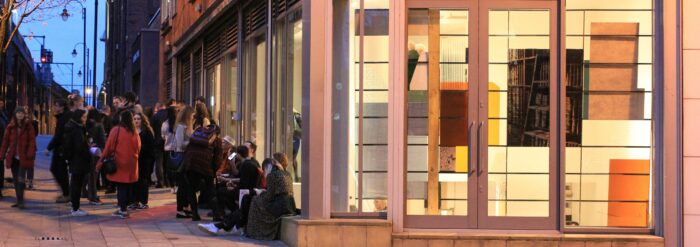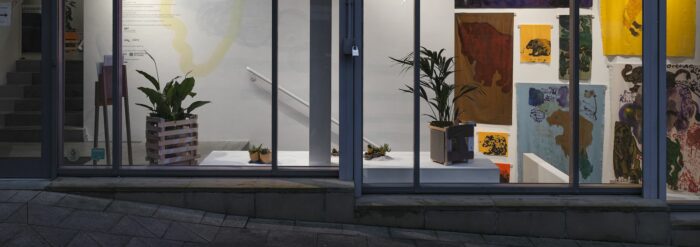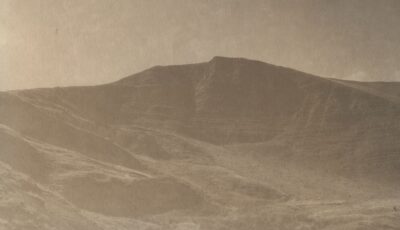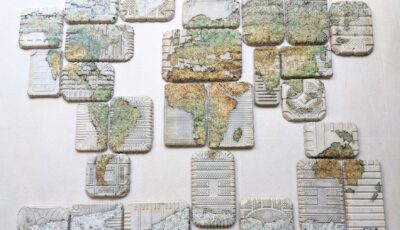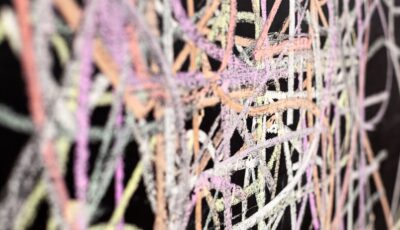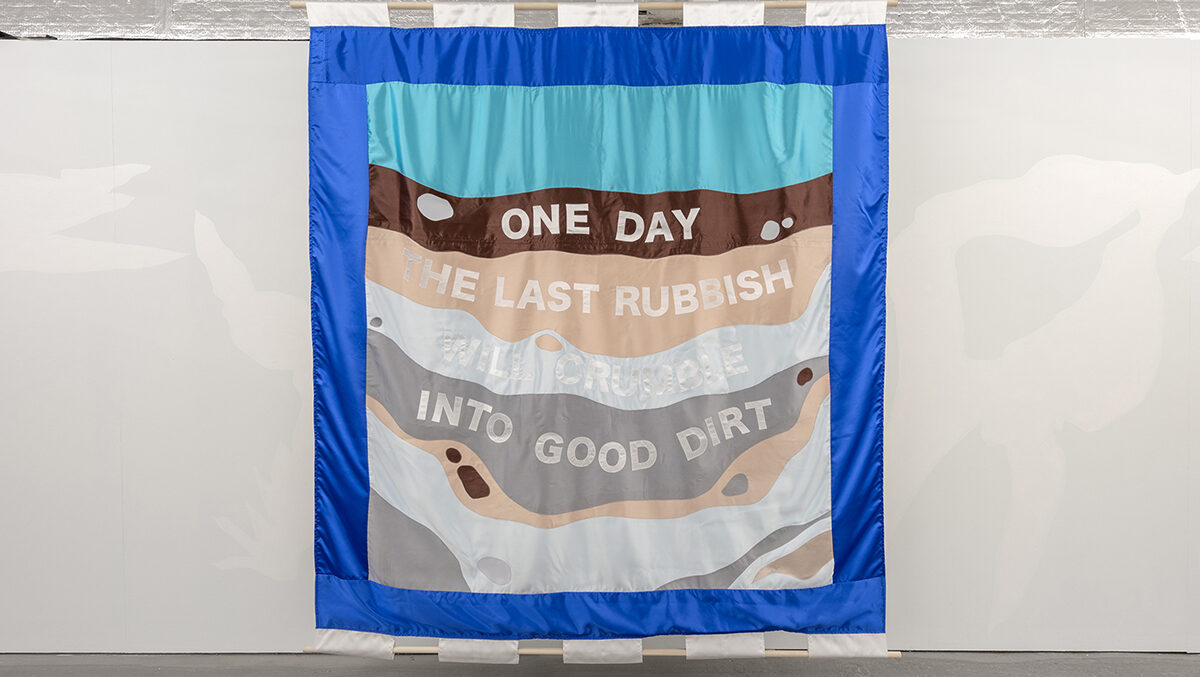
Spotlight: Artists and Sustainability – Chris Alton
Posted on 6 June 2023
This month we’ve invited Chris Alton to contribute to our ongoing series Spotlight – Artists and Sustainability, where we ask artists to share short responses about their work and how it might relate to climate change.
Chris Alton is an artist & curator, based in Manchester, UK. His practice spans a range of media and approaches, including; socially engaged projects, site specific artworks, video essays, textile banners, and publications. In 2012 he founded English Disco Lovers (EDL), an anti-fascist, pro-disco group. Other projects include; Adam Speaks (With New Mouths) (2017), a neoclassical treehouse commissioned by the National Trust; What Mortals Henceforth Shall Our Power Adore (2020), a video essay that frames the trident as a symbol of colonial intent; and Grief Must be Love with Nowhere to Go (2021-present) an ongoing exploration of grief and language in collaboration with Emily Simpson. Each project addresses an array of interconnected social, political, economic and environmental concerns. He is also an active member of the Quaker community and a skateboarder.
In what ways do you feel your work might relate to issues of climate change and sustainability, in the content of the work, its narrative, conceptually or theoretically? How might it speak to or challenge public discourse?
I’ve been addressing the climate crisis in my work for around 5 years. The first climate-related work that I made was Crudely Plucking the Strings (2018), a contemporary reimagining of a 1607 woodcut, which depicted a historic food. At that point in time, I’d been making work with political themes for several years, addressing; fascism, Britain’s colonial history, tax avoidance, and nuclear weaponry. The climate crisis began to emerge as a theme within my practice, alongside and in conjunction with these other issues.
Perhaps that’s where I differ from more mainstream public discourse(s); I rarely speak about the climate crisis in isolation*. Throughout my practice, it’s interwoven with and discussed in relationship to other phenomena, such as; our capitalist economic system; the false dichotomy of culture and nature; and the creation of hierarchies of life. It’s important to make these connections, because the climate crisis hasn’t occurred in a bubble. It is the consequence of particular histories and ways of being, which have encouraged and rewarded the exploitation of the living planet.
*I’m not the only person making such connections, of course. But I don’t think that this framing of the climate crisis would be considered the norm.
With regards to the materials, processes and techniques you use to produce your work, are there any practical decisions you make with regard to climate change and sustainability?
I’ve certainly become more mindful of the impact my material choices have. I’d been using polyester satin fabrics for several years, which are essentially spun plastics. Now I’m working with natural and reclaimed fabrics, as well as my remaining satin offcuts. More broadly, I’ve been reducing my reliance on first-use materials throughout my practice. During a recent exhibition build, we used reclaimed MDF and timber to build all of the seating and partition walls. Similarly, I made all of the cushion covers with fabric offcuts that had been kicking around for years.
However, it’s not something that I’ve always thought about. I made a large sculptural-installation work about 6 years ago, which used vast amounts of plywood, timber, glue, and other solvent-based materials. It existed for around 15 months, then ended up in a skip. If I were to try and make the same work now, I’d approach it very differently. At the very least, I’d have a clear plan for its disassembly and afterlife.
The biggest decisions that I make with regard to the climate crisis and sustainability aren’t related to the work’s production; they’re to do with its dissemination. We all know that flying by plane is one of the worst things that an individual can do when it comes to carbon emissions; the same can be said for shipping** work. But I’d like to get away from speaking about my individual choices. Whilst we all need to do more to prevent the climate crisis, we can’t address it through individual action alone. Without systemic changes across all areas of life (e.g. rapid decarbonisation, equitable redistribution of wealth, and economic degrowth) we don’t stand a chance.
**Here ‘shipping’ is a bit of a misnomer, because the majority of the time that ship is a plane.
In general, how do you feel galleries, art spaces, artworks and artists, might be able to contribute? What if any role do you feel they can play in a progressive conversation?
The climate crisis requires an urgent and immediate response. As important as it is; to protest and campaign, to prevent further oil and gas extraction, to invest in renewables, to decarbonise, to insulate homes, and to reduce our consumption – and wastage – of resources, we must also adopt deeper changes.
If the beliefs and attitudes that gave rise to the climate crisis remain intact, then further crises are inevitable. We need a fundamental shift in our relationship with the world; away from the domination of nature and towards a rekindling of our kinship – and recognition of our total entanglement – with the living planet.
I’ve come to think of art (making, exhibiting, and encountering) as a space where such shifts can take place. Art provides space for curiosity, learning, and critical thinking. I hope that such spaces might precipitate slow changes by providing nourishment and offering ideas, which subtly shift our perception of and relationship to the living planet. We need spaces to articulate alternative futures and to sow seeds that will feed us in the world to come.
Are there any tips or advice, anything you have learnt you might want to share with other artists or our audiences?
There have been times when I’ve felt overwhelmed by the climate crisis. Its enormity has weighed on me; guilt and grief in equal parts. At times, I’ve become stuck. Unable to take action. Being around other people who are working to address the climate crisis*** has been so uplifting for me. As I’ve already discussed, there is very little that we can do as individuals. Organising with others is an effective political tactic, with the added bonus of providing a source of hope.
Reading science fiction also brings me hope. The works of authors like; Ursula K. Le Guin, Octavia Butler, Kim Stanley Robinson, and Marge Piercy, have helped me to envision other ways of being in the world. Each has contributed to my belief that a post-climate crisis future is not only possible, but an opportunity to remake the world in the manner that I’ve begun to outline above.
***Quakers in Britain, Extinction Rebellion Levenshulme, SPARK, and others.
